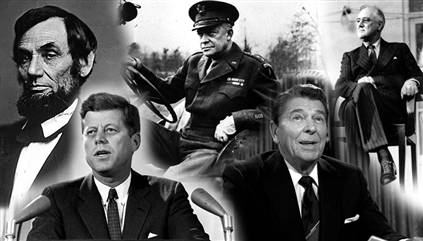
American Revolutionary War History
On April 30, 1975, the last American Helicopter flew away from the Embassy in Saigon, and the War in Vietnam was over. It was the first war that America ever lost, and was the biggest blow to the United States in the Cold War, which would continue to be a major factor in American history for the next 15 years. By 1975, Richard Nixon had already resigned and Gerald Ford was in power. The next year, facing massive unpopularity both because of his ties to the Nixon administration and his pardon of Richard Nixon, Ford lost the election to Jimmy Carter.
The Carter Years
The next four years were mostly marked by the economic stagnation that followed the war, and Carter was largely seen as an ineffective president. Though he worked to ease tensions between the Arabs and Israelis, his policy in the Middle East is mostly remembered for the Iranian Hostage Crisis, when Iran was overthrown by the Islamic Revolution, captured the diplomatic workers inside, and refused to release them until a few minutes after Carter turned power over to his successor, Ronald Reagan. He also controversially signed over the Panama Canal to the Panamanians. Though he tried to focus on human rights in his presidency, there were of course incidences of him disregarding human rights, and this did not really capture the public's attention anyway. He pardoned Vietnamese draft dodgers, boycotted the Olympic Games, and reinstated the draft. He did not last past his first term.
The Reagan Years
In 1980, Carter lost the Presidential election by a landslide to Ronald Reagan, the former movie-star and California government, who swept into office on a platform of nationalism and deregulation. He also stepped up the Cold War once again against the Soviet Union, fighting clandestine proxy wars in Central America and the Middle East. When the Soviets invaded Afghanistan, under Reagan, America began actively funding and training the mujahideen in Afghanistan. The Soviet loss in Afghanistan would eventually become a main factor in the Soviet Union's collapse.
In 1983, a commercial Airline over the sea of Japan mistakenly ventured into Soviet airspace. The USSR shot down the jet, killing all on board, including an American congressman, thus stepping up the Cold War. Reagan began rebuilding the military, including building a massive missile defense network that would supposedly shoot down any nuclear missiles coming from the Soviets. Reagan won, once again, by a landslide in 1984, and in his next four years continued on his policies of massive deregulation. He started the first real War on Drugs by intensifying punishments for possession and sales of drugs.
Reagan's administration began selling arms to Iran during the Iraq-Iran war of the 1980's, and they used the proceeds to fund the Contra paramilitaries in Nicaragua. Reagan stepped up anti-communist measures in Central America, particularly in Nicaragua and El Salvador, where the U.S. funded and trained right-wing paramilitaries and, in some cases, death squads.
Though Reagan's attitude towards the Soviets was extremely confrontational during the early 80's, when the more moderate Mikhail Gorbachev took power in the USSR, he switched to softer diplomacy, and worked with the Soviet leader to end the Cold War.
The Post-Cold War Era
Reagan's Vice-President, former head of the CIA, George Bush was elected President immediately after him, and Bush saw the fall of the Berlin Wall and the end of the Cold War. He also led an invasion of Iraq after Saddam Hussein, the Iraqi leader, invaded bordering Kuwait. This marked the beginning of a new era in politics. The collapse of communism in the Soviet Union was seen as a victory for capitalist values, and, for the next 8 years or so, this attitude more or less reigned. Markets in Asia and the Middle East were opening up to businesses for the first time, and massive economic expansion began.
One of the main issues approaching the United States in the Bush - Clinton years was the growing number of genocides throughout the world. In the old Cold War bipolar world, tensions between the Soviets and the Americans were enough to keep major genocides from happening on a truly large scale, but when the Cold War ended, these tensions ceased, and simmering political tensions exploded into genocides in the Balkans in the former Yugoslavia, and in the African state of Rwanda, where hundreds of thousands of people were killed in just a few weeks. These genocides brought a new question of intervention to the United Nations and the United States. This is a question that has still not been answered.
The Clinton years saw continued Reaganesque economic liberalization, but a more internationalist approach towards politics. The United States was still undoubtedly the world's leading superpower, so U.S. politics turned inward. Clinton, a democrat, supported welfare and more universal access to health care, and these were at the center of most debates within the U.S.
The main scandal within the U.S. of the 90's was the Lewinsky affair. While Clinton was in the Oval Office, he had an affair (several affairs, actually) with a 22-year-old intern named Monica Lewinsky. Lewinsky's friend, Linda Tripp, taped conversations with Lewinsky without her knowing, and leaked them to the press. Clinton's cover-up and denial of the whole affair led to his eventual impeachment on charges of perjury. Clinton was not removed from office, but the whole affair likely led to the loss in the following 2000 election of his Vice-President and Democratic presidential candidate, Al Gore.
The 2000 Election
In 2000, the Presidential Election battle between Vice President Al Gore and Texas Governor George W. Bush reached a pitch after election day, when the election in Florida was declared "too close to call." All of the other electoral votes had been cast, and the outcome of the election was completely dependent on who was given the Floridian Electoral votes. The final official count in Florida gave the win to Bush by 537 votes, one of the smallest election margins in history. A massive controversy exploded when the "recount" of Florida ballots revealed certain ballots had not been counted due to "hanging chads." In the end, the Supreme Court voted on the issue and was split directly down party lines, suggesting that the presidency had not been decided by law, but by the political orientation of the judges. Gore conceded the election, and Bush won.
September 11, 2001 and the War on Terror
On the morning of September 11, 2001, two hijacked commercial airplanes flew into the World Trade Center towers, and another flew into the Pentagon. Another plane crashed into a field in Pennsylvania after passengers aboard stopped the hijackers from flying it into the Capitol building. The Towers collapsed, and in the end, 3000 Americans were dead as the result of the 19 hijackers, who belonged to an extremist Islamic terrorist group known as al-Qaeda.
This event has defined modern American history. The immediate aftermath of the event led to the U.S.-led invasion of Afghanistan, where al-Qaeda was based and protected by the Taliban government. The U.S. quickly toppled the Taliban regime, but has remained in Afghanistan since, trying to stabilize the country.
For the next year and a half, the Bush administration built up the case for a war against Saddam Hussein's regime in Iraq, claiming that they were attempting to procure weapons of mass destruction which they would then use against the United States. Though U.N. weapons inspectors found no evidence of nuclear weapons or of facilities capable of making nuclear weapons, the U.S. invaded Iraq, to discover later that the intelligence upon which the invasion was based was faulty at best.
Since then, the United States has remained in both of those countries as part of an international "War on Terror," which is aimed at destroying terrorist groups that are targeting the United States or other ally nations. The war has been controversial both in the U.S. and abroad, partly because of the unjustified invasion of Iraq, and partly for the PATRIOT Act, a legislative law that gave the federal government the ability to disregard certain constitutional rights in the name of national security. This, when coupled with images and allegations of torture at the Abu Ghraib prison in Iraq and the American Naval base at Guantanamo Bay, Cuba, started a massive debate about what a government should and should not be allowed to do in the case of war, particularly regarding torture.
The Election of Barack Obama
Bush's "Cowboy Diplomacy" which operated on the basis of American interests instead of international consensus, has proven extremely controversial, and in part contributed to his extremely low approval ratings. Coming off of a backlash against the Bush years and an extremely well run campaign, Democrat Barack Obama defeated John McCain by a large margin in the 2008 Presidential elections. Obama, the first ever African American President, is a proponent of Clinton-era internationalism and engagement with the Islamic world in an attempt to diffuse tensions between the United States and other regions. It has yet to be seen how this policy will play out.

